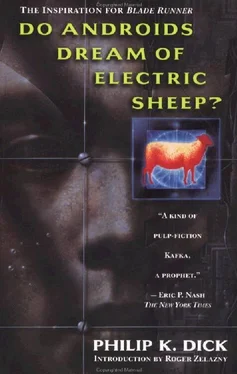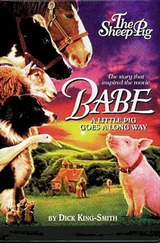“What’s he doing?” Irmgard Baty’s voice came to him distantly. “He’s breaking everything! Isidore, stop—”
“I’m not doing it,” he said. He walked unsteadily into the living room, to be by himself; he stood by the tattered couch and gazed at the yellow, stained wall with all the spots which dead bugs, that had once crawled, had left, and again he thought of the corpse of the spider with its four remaining legs. Everything in here is old, he realized. It long ago began to decay and it won’t stop. The corpse of the spider has taken over.
In the depression caused by the sagging of the floor, pieces of animals manifested themselves, the head of a crow, mummified hands which might have once been parts of monkeys. A donkey stood a little way off, not stirring and yet apparently alive; at least it had not begun to deteriorate. He started toward it, feeling stick-like bones, dry as weeds, splinter under his shoes. But before he could reach the donkey—one of the creatures which he loved the most—a shiny blue crow fell from above to perch on the donkey’s unprotesting muzzle. Don’t, he said aloud, but the crow, rapidly, picked out the donkey’s eyes. Again, he thought. It’s happening to me again. I will be down here a long time, he realized. As before. It’s always long, because nothing here ever changes; a point comes when it does not even decay.
A dry wind rustled, and around him the heaps of bones broke. Even the wind destroys them, he perceived. At this stage. just before time ceases. I wish I could remember how to climb up from here, he thought. Looking up he saw nothing to grasp.
Mercer, he said aloud. Where are you now? This is the tomb world and I am in it again, but this time you’re not here too.
Something crept across his foot. He knelt down and searched for it—and found it because it moved so slowly. The mutilated spider, advancing itself haltingly on its surviving legs; he picked it up and held it in the palm of his hand. The bones , he realized, have reversed themselves ; the spider is again alive. Mercer must be near.
The wind blew, cracking and splintering the remaining bones, but he sensed the presence of Mercer. Come here, he said to Mercer. Crawl across my foot or find some other way of reaching me. Okay? Mercer, he thought. Aloud he said, “Mercer!”
Across the landscape weeds advanced; weeds corkscrewed their way into the walls around him and worked the walls until they the weeds became their own spore. The spore expanded, split, and burst within the corrupted steel and shards of concrete that had formerly been walls. But the desolation remained after the walls had gone; the desolation followed after everything else. Except the frail, dim figure of Mercer; the old man faced him, a placid expression on his face.
“Is the sky painted?” Isidore asked. “Are there really brushstrokes that show up under magnification?”
“Yes,” Mercer said.
“I can’t see them.”
“You’re too close,” Mercer said. “You have to be a long way off, the way the androids are. They have better perspective.”
“Is that why they claim you’re a fraud?”
“I am a fraud,” Mercer said. “They’re sincere; their research is sincere. From their standpoint I am an elderly retired bit player named Al Jarry. All of it, their disclosure, is true. They interviewed me at my home, as they claim; I told them whatever they wanted to know, which was everything.”
“Including about the whisky?”
Mercer smiled. “It was true. They did a good job and from their standpoint Buster Friendly’s disclosure was convincing. They will have trouble understanding why nothing has changed. Because you’re still here and I’m still here.” Mercer indicated with a sweep of his hand the barren, rising hillside, the familiar place. “I lifted you from the tomb world just now and I will continue to lift you until you lose interest and want to quit. But you will have to stop searching for me because I will never stop searching for you.”
“I didn’t like that about the whisky,” Isidore said. “That’s lowering.”
“That’s because you’re a highly moral person. I’m not. I don’t judge, not even myself.” Mercer held out a closed hand, palm up. “Before I forget it, I have something of yours here.” He opened his fingers. On his hand rested the mutilated spider, but with its snipped-off legs restored.
“Thanks.” Isidore accepted the spider. He started to say something further—
An alarm bell clanged.
Roy Baty snarled, “There’s a bounty hunter in the building! Get all the lights off. Get him away from that empathy box; he has to be ready at the door. Go on— move him! ”
Looking down, John Isidore saw his own hands; they gripped the twin handles of the empathy box. As he stood gaping at them, the lights in the living room of his apartment plunged out. He could see, in the kitchen, Pris hurrying to catch the table lamp there.
“Listen, J.R.,” Irmgard whispered harshly in his ear; she had grabbed him by the shoulder, her nails digging into him with frantic intensity. She seemed unaware of what she did, now; in the dim nocturnal light from outdoors Irmgard’s face had become distorted, astigmatic. It had turned into—a craven dish, with cowering, tiny, lidless eyes. “You have to go,” she whispered, “to the door, when he knocks, if he does knock; you have to show him your identification and tell him this is your apartment and no one else is here. And you ask to see a warrant.”
Pris, standing on the other side of him, her body arched, whispered, “Don’t let him in, J.R. Say anything; do anything that will stop him. Do you know what a bounty hunter would do let loose in here? Do you understand what he would do to us? “
Moving away from the two android females Isidore groped his way to the door; with his fingers he located the knob, halted there, listening. He could sense the hall outside, is he always had sensed it: vacant and reverberating and lifeless.
“Hear anything?” Roy Baty said, bending close. Isidore smelled the rank, cringing body; he inhaled fear from it, fear pouring out, forming a mist. “Step out and take a look.”
Opening the door, Isidore looked up and down the indistinct hall. The air out here had a clear quality, despite the weight of dust. He still held the spider which Mercer had given him. Was it actually the spider which Pris had snipped apart with Irmgard Baty’s cuticle scissors? Probably not. He would never know. But anyhow it was alive; it crept about within his closed hand, not biting him: as with most small spiders its mandibles could not puncture human skin.
He reached the end of the hall, descended the stairs, and stepped outside, onto what had once been a terraced path, garden-enclosed. The garden had perished during the war and the path had ruptured in a thousand places. But he knew its surface; under his feet the familiar path felt good, and he followed it, passed along the greater side of the building, coming at last to the only verdant spot in the vicinity—a yard-square patch of dust-saturated, drooping weeds. There he deposited the spider. He experienced its wavering progress as it departed his hand. Well, that was that; he straightened up.
A flashlight beam focused on the weeds; in its glare their half-dead stalks appeared stark, menacing. Now he could see the spider; it rested on a serrated leaf. So it had gotten away all right.
“What did you do?” the man holding the flashlight asked.
“I put down a spider,” he said, wondering why the man didn’t see; in the beam of yellow light the spider bloated up larger than life. “So it could get away.”
“Why don’t you take it up to your apartment? You ought to keep it in a jar. According to the January Sidney’s most spiders are up ten percent in retail price. You could have gotten a hundred and some odd dollars for it.”
Читать дальше








